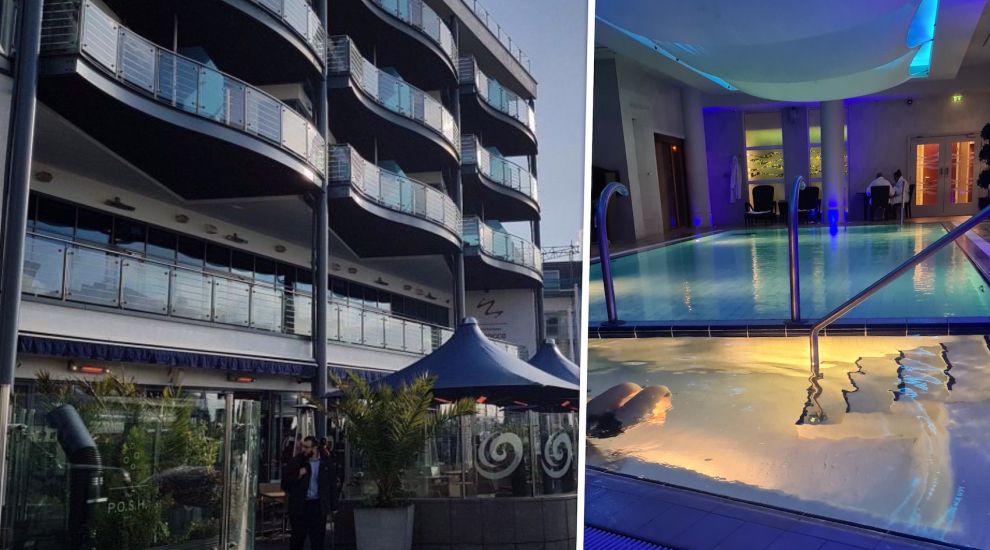


A “manifestly excessive” fine of £350,000 imposed on the Royal Yacht for keeping its spa open last summer in a “flagrant and persistant” breach of covid rules has been slashed to £100,000.
Handing down its decision on an appeal by the hotel today, the Royal Court said the previous fine had not properly taken into account the hotel’s financial situation, with much of its revenue having come from the co-funded payroll scheme.
The Royal Yacht appealed the fine last month, with Advocate Michael O'Connell arguing before Commissioner Julian Clyde-Smith, sitting with Jurats Charles Blampied, Elizabeth Dulake and Paul Nicolle, that the hotel had suffered from a combination of inadequate legal advice, financial difficulties and “confusing" communications from Government.
In its judgment, the Royal Court wrote: “There is no question in our view that it was right in principle for a fine to be imposed; the issue is the quantum of the fine.”

Pictured: The Royal Yacht had been fined £350,000 before Royal Court in April.
They noted that the prosecution had given no explanation as to why it had based its calculation of the proposed £425,000 fine on 20% of the hotel’s past profits, despite a “well-established approach of the Court."
The Court said they believed the introduction of the “very substantial figure of £425,000” was bound to have influenced the lower court in its approach to the appropriate fine.
They noted the largest penalty imposed in a health and safety case to date was £100,000 to Petroleum Distributors Jersey, as a result of what the Court described as “an extremely serious incident”, which led to a large-scale blaze at La Collette, adding that the Royal Yacht’s fine was “over three times that amount."
The Court said the lower court had also been influenced by learning the Royal Yacht had received £1.8m under the co-funded payroll scheme, noting the way the information had come to light was “unfortunate and prejudicial” to the hotel.
They went on to detail the hotel’s financial position whose financial accounts showed the a loss of £976,227, a residential income reduced from £4.6m to £1.3m and a turnover “dramatically down” from £13.3m to £5m.
“The opportunity was not taken of addressing the Inferior Number more fully on the relevance of the scheme but in our view, the co-funding of the salaries of staff who might otherwise have been made redundant has no relevance to the offence and should not have been regarded as a material factor as the judgment of the Inferior Number show it was.”
Pictured: The largest fine in a health and safety case to date, £100,000, was given to Petroleum Distributors Jersey in 2017 after an incident caused a large-scale blaze at La Collette
They said the lower court had not been given the “assistance” it should have been, as they had neither seen a report from an accountant on the impact of the fine, nor had been given information about the hotel’s cash position and its cash flow forecast.
They added that it was “difficult to understand” how the Crown could have assumed the Royal Yacht was in “good financial health” and could pay a fine of £425,000 as its turnover had “more than halved” and it had made a “substantial loss whilst still carrying very high levels of borrowing."
“It was known that the economic impact of the lockdown and subsequent restrictions were severe and unprecedented, with the impact being felt within the hospitality sector in particular. The outlook for that sector is still uncertain,” they wrote.
Referring to the criticism levelled at Advocate Stephen Chiddicks during the appeal hearing over the legal advice he had given to the hotel, the Court said that when criticising the conduct of the defence case, they had done so on the assumption that the lawyer was “at all times acting on the instructions of the client."
The Court concluded that the fine was “manifestly excessive” and outside the range available to the lower court, who had given no explanation as to how the figure had been arrived at.

Pictured: The Royal Court said the lower court had not been given the “assistance” it should have been, to decide on such a large fine.
They went on to say they considered the hotel’s breaches as “more serious” than those of Petroleum Distributors Jersey and that they agreed with the lower court that the hotel’s level of culpability was “high”.
“There is no excuse for senior management not checking the position with the relevant authorities or taking advice, especially when the issue of the jacuzzi being open was raised by the spa manager on a few occasions. It was not clear to us what the senior management did to satisfy themselves that these particular fines could be opened.”
They however added that the hotel’s ability to pay a large fine was an issue and that its financial position was “challenging”, noting its main secured creditor would not allow the £350,000 fine to be paid out of the company’s funds, and required a minimum of half a million to be maintained in the hotel’s bank account.
The Court decided to impose a £100,000 fine and gave the hotel three months to pay it, which they felt the hotel should be able to do. “This is a very substantial fine which is more than sufficient to sting and to meet the need to punish and deter,” they wrote.
Following the judgment, Advocate O’Connell argued that the Royal Yacht shouldn’t have to pay £5,000 towards the prosecution's costs, as it would be “wholly wrong to compensate a party for a bad job."
The Court has reserved its judgment on the matter and will announce its decision at a later date.
Royal Yacht fined £350,000 for “flagrant and persistent” covid spa breach
Comments
Comments on this story express the views of the commentator only, not Bailiwick Publishing. We are unable to guarantee the accuracy of any of those comments.